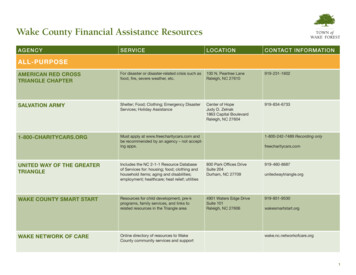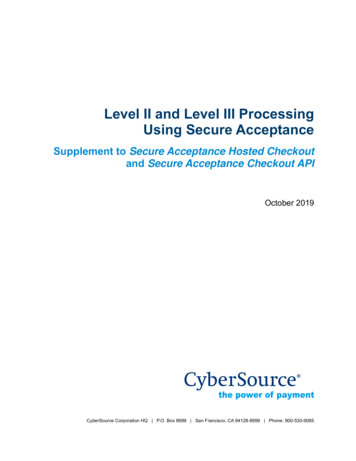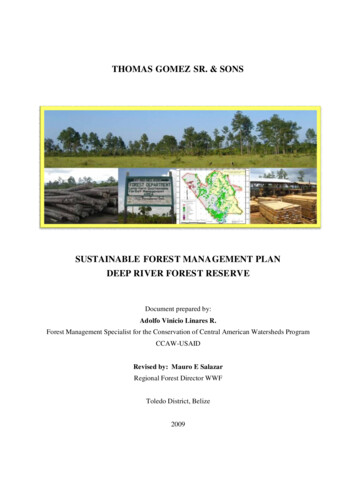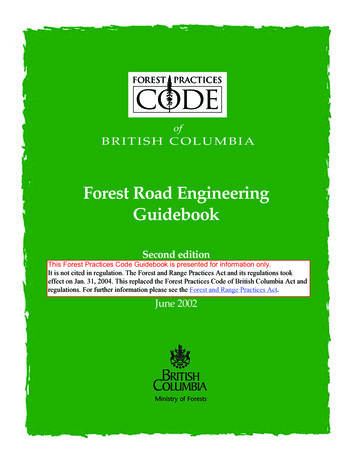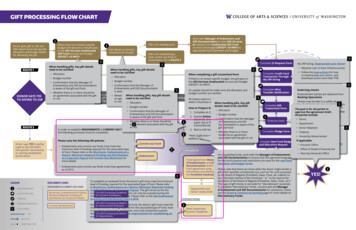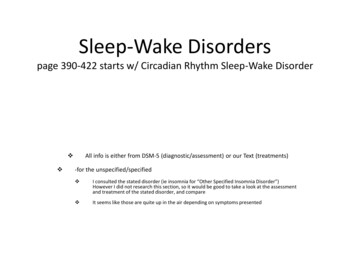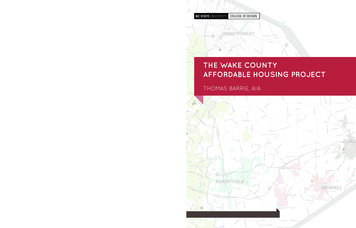
Transcription
Wake Forest UniversityGift Acceptance PolicyC.Dr. Nathan 0. HatchREVISED DATE1September 30, 2020
Table of ContentsINTRODUCTION3AUTHORIZATIONS3GIFT DOCUMENTATIONS REQUIREMENTS5GIFT RECORDING POLICIES6TYPES OF GIFTS AND VALUATION OF GIFTS7GIFT ACCEPTANCE GUIDELINES11RESPONSIBILITIES13DEFINITIONSAppendix AMINIMUM ENDOWMENT LEVELSAppendix BOTHER NAMING OPPORTUNITIESAppendix B2
Wake Forest University Gift Acceptance PolicyIntroductionThe Wake Forest University Gift Acceptance Policy has been developed for the purpose ofproviding:1) complete and accurate reporting of gifts and pledges2) guidance for compliance with IRS regulations and acceptable business practices3) guidance for persons involved in gift solicitation, recording, and management for WakeForest UniversityThe purpose of the Gift Acceptance Policy is to insure that gifts:1) are appropriate to the mission and needs of the University2) impose no undue financial burdens on the University3) if restricted, are written in reasonably broad and flexible terms to maximize theirusefulness to the University; and4) if restricted, include language that permits the University to apply the gift to a relatedpurpose in the event that the designated purpose is no longer practical, necessary orable to be performedThe Gift Acceptance Policy applies to Wake Forest University and all subsidiaries excludingReynolda House and the Wake Forest University Health Sciences and subsidiaries. This policywas adopted by the Gift Acceptance Committee (the “Committee”) and approved by thePresident as of September 30, 2020AuthorizationsA Gift Acceptance Committee will be responsible for enforcing and interpreting this GiftAcceptance Policy. The Committee will include the following: Vice President of UniversityAdvancement, the Controller, the Provost, the General Counsel, the Chair of the FacultySenate, the Chair of the University Policy Committee, and the Executive Vice President.Deliberations of the Committee will be convened by the Associate Vice President, Alumniand Donor Services. Representatives from schools, the Faculty Senate, centers, institutes,or other entities may be consulted on gifts for the school, center, etc., in question.The Gift Acceptance Committee will review gifts of 1 million or more to insure that thefour principles outlined above are applied consistently. It is the responsibility of the divisionmanagers within University Advancement, (the Senior Associate Vice President of3
Development, the Associate Vice President of Family Engagement, Associate Vice Presidentof Gift Planning and the Associate Vice President of Alumni and Donor Services), to bringany gift that is not consistent with this policy or any problematic gift within their unit to theVice President of University Advancement. It is the responsibility of the Vice President ofUniversity Advancement to attempt to resolve problematic gifts of real or personal propertyin consultation with the Executive Vice President. Other problematic gifts may be referredto the Gift Acceptance Committee at the discretion of the Vice President of UniversityAdvancement. Reasonable effort will be made among the members of the Gift AcceptanceCommittee to reach a consensus on actions and recommendations. Should the GiftAcceptance Committee be unable to reach consensus, a vote will be taken and the majorityposition will be the Committee’s recommendation to the President, who is ultimatelyresponsible for the acceptance of all gifts to the University.Examples of problematic or unusual gifts are offers to endow courses that are notacademic priorities, to create new institutes or centers that are not academic priorities, toestablish new programs that are not academic priorities, or to build or change facilitiesthat are not academic or administrative priorities. Problematic gifts may also be offeredwith unacceptable restrictions. A scholarship could be restricted to individuals from asmall geographic area, for example, making it unlikely to be awarded on a regular basis.Gifts may also be considered problematic if it is determined by any member of the GACthat accepting them might bring reputational harm to the University. Such gifts mayinclude contributions closely associated with illegal activity or suspected illegal activity.Such gifts should be referred to the Gift Acceptance Committee. The President of the University is ultimately responsible for the acceptance of all gifts tothe University. No general or group solicitation of funds may be undertaken by any school or academicdepartment without approval of the Provost and the Vice President for UniversityAdvancement as set forth in the Wake Forest University Fundraising Approval and PrioritySetting policy. In cases where the level of priority for a project is not clear, the VicePresident for the University Advancement or his/her designee will consult the Provost ofthe University. No approach outside of approved funding priorities may be made to a donor, whether anindividual, foundation, corporation, federation, association, other donative entity, or togrant-making entities, without approval from the Vice President of UniversityAdvancement or his/her designated representative. For information regarding theapproval of fundraising priorities see the Fundraising Approval and Priority-Setting Policy.4
The Vice President for University Advancement in consultation with the Executive VicePresident and the Provost is responsible for development and implementation of policies and procedures that are consistent with this Policy. Recommended policies are thenreferred to the Gift Acceptance Committee and the President for approval. No fundraising consultants, individuals or firms will be hired to work on behalf of WakeForest University or any school, center, institute, program, or division of the Universitywithout prior approval of the Vice President for University Advancement or his/herdesignee. Gift records at Wake Forest University are confidential and may only be accessed ordisclosed to employees with a need to know the information in order to perform theirrespective job duties. Information regarding donor gift histories, lists of donors, and allrelated materials are disclosed to others only with the authorization of the VicePresident of University Advancement or his/her designated representative. Requestsfor donor information from the President, General Counsel, Senior Vice President,Provost, University auditors and as required by law are exempt from this formalapproval process. Should the Gift Acceptance Committee find itself unable to resolve a procedural orpolicy issue regarding a gift, the issue will be referred to the President for finalresolution. The Office of University Advancement is responsible for:oooooodonor stewardshipimplementing and enforcing the gift policies of Wake Forest Universitymanaging the process of solicitations by staff, volunteers, faculty and others inaccordance with approved gift policiesmanaging the solicitation process and receipt of gifts in consonance withapproved University fundraising prioritiestransmitting cash gifts and non-cash gifts to the Controller in a timely andaccurate fashiondocumenting all gifts and pledges in accordance with gift acceptance policiesConversations and deliberations of the Gift Acceptance Committee are confidential and mayonly be accessed or disclosed to employees with a need to know the information to performtheir respective job duties.Gift Documentation Requirements5
(separate from gift entry procedures which are incorporated into the Gift Entry ProceduresManual).All gifts to Wake Forest University require written documentation before being“counted” toward University fundraising goals. For outright gifts or multi-year pledges,documentation will usually be a signed by the donor or his/her legal representative orPower of Attorney and dated pledge agreement.Otherooooacceptable documentation:deeds or other forms of conveyance or assignmentInsurance policy conveyance or assignmentcompleted wills, excerpts therefrom or by completing a bequest intention formrevocable and irrevocable trust agreements in which Wake Forest University isnamed beneficiaryo copies of electronic correspondence from the donor confirming pledgecommitments made via personal conversation with a development officero endowment and/or restricted gift fund agreements signed by the University andthe donorNote: Because counting conventions for purposes of reporting fundraising results may differfrom conventions used in the audited financial statements, the Controller and the VicePresident for Advancement will designate representatives to develop procedures to reconcilethese respective reports and statements on at least a quarterly basis.Gift Recording Policies All gifts, pledges, and bequest distributions to Wake Forest University will be recordedin compliance with IRS regulations and CASE (Council for Advancement and Support ofEducation) Reporting Standards and Management Guidelines. For the purposes offinancial reporting all gifts, pledges and bequest distributions will be recorded incompliance with General Accepted Accounting Principles. All gifts to Wake Forest University are acknowledged in writing. Acknowledgementsmay be delivered electronically at the donor’s request or according to Universitypractice. The process is reviewed periodically by the Vice President of UniversityAdvancement or by his/her designate. Receipts will not be issued for gifts of service. (Service is not recognized by the InternalRevenue Service as a constituting a gift.) Recognition for service is determined at thediscretion of the Vice President of University Advancement.6
Gifts will be recorded by donor and purpose. For advancement records, “purpose” willbe defined as current/expendable unrestricted; current/expendable restricted;endowment; and plant (buildings and facilities of physical plant). For accountingpurposes, these designations will be determined by the Vice President of UniversityAdvancement or his/her designee based on generally accepted accounting principles,IRS regulations, and other definitions approved by the Controller.Types of Gifts and Valuation of GiftsThese are general guidelines. Valuation of gifts will be addressed by the Gift AcceptanceCommittee for non-cash gifts. Gifts may be viewed in three ways:o the value of the gift for tax purposeso the value of the gift for counting toward University fundraising goalso the recognition of the gift (as in gift societies, plaques etc.) The value of the gift toward any approved University fundraising goal will, in themajority of cases, be determined by the Campaign Management and ReportingStandards established by the Council for Advancement and Support of Education (CASE).Exceptions:o Campaign commitments will include three distinct types of transactions:Outright Commitment, Irrevocable Planned Commitments and RevocableCommitmentso Each type of commitment will be reported separatelyo Revocable commitments will be reported at the declared “face” value fordonors of age 70 or donors who will reach the age of 70 during aspecified campaign period without regard to size in accordance with theguidetines embraced by the National Committee on Planned Giving. Fordonors between 50 years of age and 69 years of age, revocablecommitments will be reported at the discounted value of thecommitment.All other exceptions must be authorized by the Gift Acceptance Committee in writing. Wake Forest University’s receipt for gifts of cash is provided to donors to establish thevalue of a gift for tax purposes. A confirmation of gifts of “publicly traded securities”stating the securities being donated and the number of shares of said security will besent to the donor. This letter will state the amount of the gift or pledge payment creditgiven to the donor in exchange for the gift. In all cases other than gifts of cash or cashequivalents it is the responsibility of the donor to secure independent expert appraisals7
to establish tax deductible values, and the valuation of the gift for tax purposes is theresponsibility of the donor. The University, as donee, is not regarded as “independent”by the Internal Revenue Service. It is the policy of the University not to pay forappraisals unless the appraisal is for the benefit of the University. Cash: gifts by cash, check or credit card will be credited at full face value. Pledges:o Wake Forest Fund pledges, which are usually unrestricted cash gifts will beaccepted if payable over a period of five years or less. The Vice President ofUniversity Advancement or his/her designee may make exceptions for large orunusual gifts, at the specific request of a donor, or under other extenuatingcircumstances at his/her discretion.Pledges for major gifts (See Appendix A for definition of Major Gifts) will beaccepted if payable over a period of up to seven years. The Vice President ofUniversity Advancement or his/her designee in consultation with the ExecutiveVice President may make exceptions for large or unusual gifts, at the specificrequest of a donor, or under other extenuating circumstances at his/herdiscretion.oMajor Gift pledges that are not fulfilled within the agreed upon time period mustbe reviewed by the Vice President of University Advancement in consideration ofany applicable fund agreements signed by the donor and the University. In theabsence of such an agreement, if the gift total does not reach the specified leveland the gift in question does not meet the minimum level to endow a fundwithin seven years from the date of commitment the University will make areasonable effort to spend the gift in a manner that is consistent with the gift’sdocumented purpose and on a schedule determined by Wake Forest.oAnnual Fund pledges that are not fulfilled within the agreed upon time periodare marked as un-honored commitments.oAdvancement will notify the Controller of all changes to previously recordedpledge amounts at least once each quarter.oPublicly Traded Securities: the University will accept marketable securities asoutright gifts or payments toward pledges or life income gifts. Such gifts will bevalued at the mean market value on the date of the gift, in accordance with IRSregulations. A confirmation of gifts of “publicly traded securities” specifying theS
securities being donated and the number of shares of said securities will be sentto the donor. This confirmation will state the amount of gift or pledge paymentcredit given to the donor in exchange for the gift.o Closely Held Securities: securities not traded on an exchange or over-the-countermay be accepted at the discretion of the Gift Acceptance Committee. Anyrestrictions sought by a donor on the disposition by the University of suchsecurities must receive specific approval of Gift Acceptance Committee. The fairmarket value of the securities should be determined by independent appraisalobtained by the donor and may be appraised separately by the University.Real Property: donors may contribute real estate in the following ways:a) fee interestb) life estates, subject to satisfactory life estate agreementc) life income giftThe fair market value of the property should be determined by an independentapprais& obtained by the donor and may be appraised separately by the University.Property must have a “clear and marketable” title. Easements and/or restrictions mustbe disclosed (and acceptable to Wake Forest). Title to property contaminated withhazardous waste will not be accepted. Exceptions must have the unanimous approval ofthe Gift Acceptance Committee or Presidential approval.The due diligence procedures for accepting gifts of real property are the responsibHity ofthe Executive Vice President and Vice President of University Advancement, inconsultation and coordination with other offices and departments of the University(such as, but not limited to the Legal Department or the Real Estate ManagementDepartment), as appropriate. After appropriate due diligence has been completed, theExecutive Vice President and Vice President of University Advancement will then make arecommendation to the Gift Acceptance Committee to accept or not accept the gift ofreal property. The Gift Acceptance Committee will then be responsible forrecommending acceptance of gifts of real property to the President. Items forconsideration: the usefulness of the property for University purposes; the marketabilityof the property; the existence of any restrictions, limitations or encumbrances. (Duediligence procedures are incorporated here by reference; the Executive Vice President inconsultation with the Gift Acceptance Committee, will be responsible for developingsuch procedures. Due diligence may include testing for hazardous waste and otherenvironmental conditions.)Gifts of real property are to be made to the Wake Forest Development Foundation wheneverpossible. For additional guidance on accepting gifts of Real Property consult the office ofPlanned Giving.9
Tangible Personal PropertyGifts of Tangible Personal Property may be counted toward fundraising goals given appropriatedocumentation. Gifts of tangible personal property of 5,000 or more require an independentappraisal of fair market value obtained by the donor for tax purposes. All gifts of TangiblePersonal Property of 500 or more also require the completion of IRS document 8283. TheUniversity Controller or his/her designate will be responsible for signing form 8283 for gifts ofTangible Personal Property of 5,000 or more on behalf of Wake Forest. Acceptance of gifts ofTangible Personal Property, as well as approval of any restrictions sought by the donor on thesale, maintenance, administration or display of property donated, is subject to review andapproval by the Gifts Acceptance Committee and the head(s) of the appropriate department(s)of the University before the gift can be accepted.The Gift Acceptance Committee defers acceptance of gifts of Tangible Personal Property valuedless than 5,000 to a joint decision of University Advancement and the accepting departmentproviding the full cost of the acceptance and maintenance can be covered by the department’scurrent operating budget. Acceptance of a gift of art may be reviewed by the Art CollectionsAdvisory Board in conjunction with input from the department chair person or representativethat will benefit from the gift. Gifts of books and manuscripts to the Libraries may have theinput of the University Librarian. Gifts benefitting the Museum of Anthropology may bereviewed by the Advisory Board’s Collections Committee with input for the Museum’s Director.Gifts that would cause significant facilities and installation issues must have input of theExecutive Vice President. The University reserves the right to dispose of the tangible gifts at anytime, in accordance with law, unless otherwise agreed to with the donor.Additional Gift Types Cryptocurrency—Wake Forest will accept forms of cryptocurrency that have anequivalent value in real currency or that acts as a substitute for real currency, alsoknown as “convertible virtual currency”. Such forms of cryptocurrency are listed on anexchange and the exchange rate is established by market supply and demand. The fairmarket value of the virtual currency is determined by converting the virtual currencyinto U. S. dollars at the exchange rate in a reasonable manner that is consistentlyapplied. Contributions of cryptocurrency will be treated as a contribution of TangiblePersonal Property.Contributions of Cryptocurrency must be converted to US Dollars as swiftly as ispracticable. They may not be made in a completely anonymous manner althoughdonors may request anonymity in publications and/or gift announcements. All gifts ofcryptocurrency are considered irrevocable upon conversion to US Dollars and may notbe refunded.10
Bargain Sales: may be accepted with an independent appraisal and otherdocumentation necessary to establish the value of the gift. This should not be confusedwith the value to the donor for tax deduction purposes. Gifts of Insurance: before an insurance policy can be recorded as a gift, the policy mustbe gifted to the University. The University must be an assigned irrevocable beneficiaryand owner. Corporate Matching Gifts: gifts received in cash from organizations or corporations tomatch gifts of cash or securities by individuals associated with the organization orcorporation will be credited to the individual donor’s gift record (soft credit) andallocated to the same purpose of the donor’s gift, unless corporate rules specifyotherwise. All life income gifts will be recorded for tracking purposes at both face value and presentvalue. For minimum gift requirements see the Office of Planned Giving.Charitable Remainder Trusts: the establishment of such an irrevocable trust at WakeForest University or at another trust institution where Wake Forest is the irrevocableremainderman will be credited at the fair market value of the assets received. Such giftswill be reflected on the monthly development reports at face value.Charitable Lead Trusts: for lead trusts that extend five years or less, the face value maybe reported; for charitable least trusts that extend beyond five years, amounts beyondthe first five years may be valued both at remaining face value (for recognition of thedonor) and at discounted present value of the remaining income stream (to permit cashflow projections). Bequests: distributions from estates and trusts received by Wake Forest University willbe credited toward the purposes set forth by the relevant documents. Wheneverpossible, unrestricted Major Gifts, as defined in Appendix A, through estates and trustswill be invested with University endowment funds at the recommendation of the GiftAcceptance Committee and the approval of the Board of Trustees. Gifts that do notqualify as a Major Gift may be allocated at the discretion of the Vice President forUniversity Advancement.Certain newly established bequests (testamentary pledge commitments) may becounted toward fundraising goals with proper documentation. For donors of age 70 andolder, or donors who will reach the age of 70 during a specified campaign period,intended bequests will be valued and recognized at full value. Commitments from11
donors between 50 years of age and 69 years of age will be recognized for the fullamount of the gift, however, these will be valued according to the donor’s actuarial lifeexpectancy. Commitments from donors less than 50 years of age will not be included.Gift Acceptance GuidelinesRestricted gifts should include language providing Wake Forest University with reasonableflexibility:(example)“The Donor and Wake Forest acknowledge that although gifts to an endowed fund are designedto last in perpetuity, it is impossible to anticipate how changing circumstances in the futuremay impact Wake Forest’s ability to comply with all of the provisions of this Agreement.Accordingly, if future developments make it impracticable for Wake Forest to carry out thespecific terms of this Agreement, the Board shall have the discretion to redirect the use of theFund as set forth below. During the lifetime of the Donor, Wake Forest will seek the writtenconsent of the Donor to amend the purpose of the Fund. After the lifetime of the Donor, theBoard may use the distributions for such purposes as in its opinion will, to the extentpracticable, honor the Donor’s desires as expressed in this Agreement and best further theobjectives and welfare of Wake Forest.” Irrevocable gifts, such as trusts, managed by entities such as a bank or foundationoutside of Wake Forest University will be accepted and valued in the same way as othergifts to Wake Forest University. Such gifts will appear only once in the standard monthlyreporting by the advancement office. No gift will be accepted that would constitute an undue burden on the University. It isthe responsibility of the development officers, and other University representativesinvolved in fundraising initiatives, to work in coordination with the offices of theProvost, Financial Aid, Merit Scholarships and Financial Management to meet thisstandard. University Advancement will attempt to reach resolution with a given donor,but gifts with the implication of imposing a burden on the University will be carefullyexamined, and those that cannot be resolved will be referred to the Gift AcceptanceCommittee for resolution. Examples of gifts that could impose an undue burden on theUniversity include, but are not limited to:o gifts of unmarketable securitieso tangible property with restrictions on its useo “matching” requirementso commitment to continue a project after a gift has been terminated or exhaustedo gifts toward construction projects that do not permit the University to fully fundthe project, including planning design, construction, FF&E, and ongoingmaintenance and repairs12
oooestablishment of a permanent, interest-bearing (endowed) fund when the giftamount is not sufficient to carry out its specified purposeto finance and/or administer a project outside the routine functions of theUniversity or outside its missionCertain gifts of real estateReturn of a GiftThe University may return a gift to the donor if the Gift Acceptance Committee determines thatthe gift could cause damage to the University’s reputation, standing or integrity through itsassociation with the donor or by using the gift for its intended purpose. Any member of theGift Acceptance Committee may bring forward to the Gift Acceptance Committee arecommendation to review a previously accepted gift that they deem to be potentiallyproblematic. Reasonable effort will be made among the members of the Gift AcceptanceCommittee to reach a consensus on actions and recommendations regarding the disposition ofa potentially problematic gift. Should the Gift Acceptance Committee be unable to reachconsensus, a vote will be taken and the majority position will be the Committee’srecommendation to the President, who is ultimately responsible for the acceptance of all giftsto the University.ResponsibilitiesThe responsibilities of each department or employee of the University in connection with thisGift Acceptance Policy are as follows:1) Development officer and other University representatives involved in cultivationand solicitation must follow procedural clearances for fundraising. Alldevelopment officers, deans, vice presidents, senior officers, and faculty who areso involved must:o read and understand the Gift Acceptance Policy and related policieso report gifts and pledges promptlyo route checks and other monies to Advancement Services promptlyo understand and use gift and pledge recording forms and systemso understand and use prospect tracking systems to maintain accurate andtimely prospect status and tracking2) Schools, Centers, Institutes, Libraries, and other Academic Units:o Director, Department Head, or Dean to communicate the Gift AcceptancePolicy and related policies to faculty and staff (an annual distribution isrecommended)o establish appropriate review procedures to ensure compliance with theGift Acceptance Policy13
oFollow guidelines and procedures set forth in the Wake Forest UniversityFundraising Approval and Priority Setting Policy.3) Universityo recommendations for gift policies and acceptance are the responsibilityof the Gift Acceptance Committeeo final responsibility for acceptance of all the gifts rests with the President4) Executive Vice Presidento Valuation of gifts and Tangible and Real Propertyo Developing due diligence procedures and conducting due diligence foraccepting gifts and real property5) Advancement Serviceso Gift recording and gift accounting6) University Advancemento Recommendations regarding the minimum funding levels and namingopportunitieso Updating appendices to the Gift Acceptance Policy as necessary14
Appendix ADefinitions Bequest: a gift through an estate or trust. Budget Augmentation: an expendable gift made to the University to be used to coveroperations and which was not reflected in a given fiscal year’s board approvedoperating budget. Budget augmentation funding is considered additional, orincremental to the fiscal year budget and is typically used to cover one-time costs orpurchases. Budget Reducing/Budget Relieving Gift: an expendable gift made to the University tocover annual operating costs. Such gifts which are made in support of units ordepartments that are centrally funded (such as the library or student financial aid),reduce the need for the University to allocate tuition and fees to support thoseoperations, and therefore, are considered budget reducing/budget relieving, unless theExecutive Vice President and the Provost otherwise agree to designate such gifts forbudget augmentation. Cryptocurrency: Also known as “virtual currency” may take any form of currency thatonly exists digitally, that usually has no central issuing or regulating authority butinstead uses a decentralized system to record transactions and manage the issuanceof new units, and that relies on cryptography to prevent counterfeiting andfraudulent transactions Designation Pending: a term used to describe a gift that is held in a temporary fundwhile discussions continue with the donor to determine the purpose for which the giftmay be used. Designation pending may also be used to hold a gift prior to a Universitydecision as to usage. A gift in designation pending for more than two years will revert togeneral institutional purposes unless specific arrangements have been made with thedonor and the Gift Acceptance Committee has approved. Endowment: a fund that is not wholly expendable by Wake Forest on a current basisunder the terms upon which the fund was established. The minimum required toestablish an endowed fund is set forth in Appendix B. The fund is invested “inperpetuity” and a portion of the fund’s earnings, base
President and the Provost is responsible for development and implementation of policies and procedures that are consistent with this Policy. Recommended policies are then referred to the Gift Acceptance Committee and the President for approval. No fundraising consultants, individuals or firms will be hired to work on behalf of Wake
